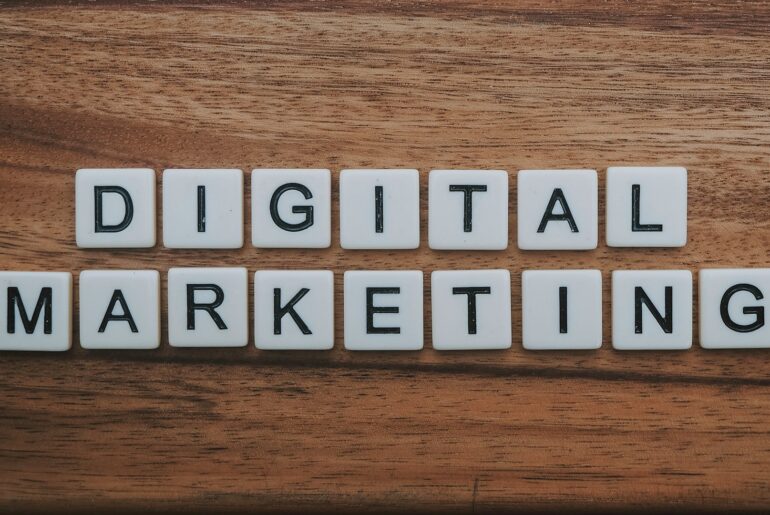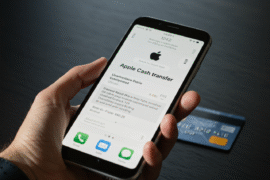This article may contain references to products or services from one or more of our advertisers or partners. We may receive compensation when you click on links to those products or services. Nonetheless, our opinions are our own.
The information presented in this article is accurate to the best of our knowledge at the time of publication. However, information is subject to change, and no guarantees are made about the continued accuracy or completeness of this content after its publication date.
- Key Highlights
- Introduction
- Understanding the Shift from Traditional to Digital Marketing
- Why Digital Marketing is the Future
- Essential Skills for a Career in Digital Marketing
- Beginner’s Guide to Starting a Career in Digital Marketing
- Exploring Career Paths in Digital Marketing
- Building Your Digital Marketing Portfolio
- Networking and Professional Development in Digital Marketing
- Conclusion
- Frequently Asked Questions
- Recommended Reads
Key Highlights
- Learn the essential skills to successfully transition from traditional marketing to digital marketing.
- Understand the key differences between traditional and digital marketing strategies.
- Explore why digital marketing is a crucial aspect of the marketing landscape today and for the future.
- Discover the significance of data analytics in decision-making for digital marketing campaigns.
- Gain insights into the step-by-step guide for starting a career in digital marketing effectively.
- Explore various career paths in digital marketing, including roles like Social Media Manager and Content Marketing Specialist.
Introduction
In today’s digital world, having a strong online presence is essential for businesses. Consumers increasingly rely on the internet for information and purchasing decisions, making traditional marketing less effective. This shift has created high demand for skilled digital marketers who can navigate the complexities of online marketing. If you are a traditional marketer, transitioning to digital marketing can be a rewarding career move.
Understanding the Shift from Traditional to Digital Marketing
Marketing has evolved significantly from print ads and billboards to digital strategies that leverage online platforms such as websites, search engines, social media, and email marketing. This transition is driven by increased internet and mobile device usage, making it crucial for businesses to have a strong online presence.
The Evolution of Marketing Strategies
Traditional marketing relied on one-way communication, where businesses delivered messages through mass media. With digital marketing, customer engagement has become interactive, allowing businesses to directly converse with their audience. Digital channels such as content marketing, email campaigns, and social media provide a more personalized experience.
Key Differences Between Traditional and Digital Marketing
One of the primary differences between traditional and digital marketing is the ability to measure results. Digital marketing provides real-time analytics tools like Google Analytics, enabling marketers to track website traffic, conversion rates, and customer behavior. Unlike traditional marketing, which often relies on estimated results, digital marketing offers precise, data-driven insights.
Additionally, digital marketing enables businesses to target specific audiences based on demographics, interests, and online behaviors. This ensures marketing efforts reach the right people, leading to increased engagement and a higher return on investment.
Why Digital Marketing is the Future
Digital marketing offers opportunities for audience engagement, performance tracking, and business growth. As technology advances and consumer behavior shifts online, the digital marketing landscape will continue to expand, creating diverse career opportunities for skilled professionals.
Social media platforms like Facebook, Instagram, and LinkedIn have transformed how businesses interact with consumers. These platforms allow companies to build brand awareness, foster communities, and engage with customers in real time. Influencer marketing has also gained popularity, enabling brands to reach wider audiences through trusted voices.
The Importance of Data Analytics in Decision-Making
Data analytics is crucial in digital marketing, helping businesses make informed decisions. Tools like Google Analytics provide insights into website traffic, user behavior, and campaign performance. By analyzing this data, businesses can optimize their marketing strategies, improve user experience, and maximize return on investment.
Voted "Best Overall Budgeting App" by Forbes and WSJ
Monarch Money helps you budget, track spending, set goals, and plan your financial future—all in one app.
Get 50% OFF your first year with code MONARCHVIP
Essential Skills for a Career in Digital Marketing
Succeeding in digital marketing requires a combination of technical and creative skills. Here are some essential competencies to develop:
Mastery of SEO and SEM Techniques
Search Engine Optimization (SEO) and Search Engine Marketing (SEM) are fundamental to digital marketing. SEO enhances a website’s visibility on search engines, while SEM involves paid advertising to drive traffic. Professionals skilled in keyword research, content optimization, and paid advertising campaigns are highly sought after.
Proficiency in Content Creation and Strategy
Content marketing involves creating and distributing valuable content to attract and retain customers. Successful content marketers craft compelling blog posts, social media updates, and videos to engage their audience. A well-planned content strategy enhances brand visibility and customer loyalty.
Beginner’s Guide to Starting a Career in Digital Marketing
Transitioning into digital marketing may seem overwhelming, but a structured approach can make the process manageable.
What You Will Need to Get Started
You don’t need an advanced degree to start in digital marketing. Online courses, boot camps, and certifications provide the foundational knowledge necessary. Digital marketing certifications from platforms like Google, HubSpot, and Facebook can validate your skills and improve employability.
Step-by-Step Guide to Transitioning into Digital Marketing
- Learn About Digital Marketing: Take online courses, read industry blogs, and familiarize yourself with key concepts like SEO, PPC, and content marketing.
- Build Your Online Presence: Create a professional website or portfolio showcasing your skills and projects.
- Get Practical Experience: Seek internships, freelance projects, or volunteer opportunities to gain hands-on experience.
Exploring Career Paths in Digital Marketing
Digital marketing offers diverse career opportunities. Below are some prominent roles in the field:
Social media managers oversee a company’s online presence, develop content strategies, and engage with audiences on platforms like Instagram, Twitter, and LinkedIn. They track social media performance and optimize campaigns to enhance brand visibility and engagement.
Careers in Content Marketing and Strategy
Content marketers specialize in creating valuable content to attract customers. They craft blog posts, articles, videos, and infographics that align with a brand’s voice and audience preferences. A strong content strategy can drive traffic and boost customer engagement.
Building Your Digital Marketing Portfolio
A well-curated portfolio showcases your expertise and accomplishments. Highlight projects that demonstrate your ability to execute digital marketing strategies effectively.
Showcasing Your Digital Marketing Projects
Include case studies detailing your role, strategy, and measurable results. Use data visualization tools to present performance metrics clearly.
Incorporating Testimonials and Certifications
Client testimonials and industry-recognized certifications enhance credibility. Displaying Google Analytics, Google Ads, and HubSpot certifications can strengthen your portfolio.
Networking and Professional Development in Digital Marketing
Continuous learning and networking are essential for career growth in digital marketing. Engage with industry professionals, attend events, and join online communities to stay updated on trends.
Joining Digital Marketing Communities
Participating in forums, LinkedIn groups, and industry webinars can provide valuable insights and career opportunities.
Attending Workshops and Conferences
Digital marketing conferences offer exposure to industry leaders, emerging trends, and networking opportunities. Workshops provide hands-on experience in various digital marketing disciplines.
Conclusion
Transitioning from traditional to digital marketing is essential for staying relevant in the evolving marketing landscape. Understanding SEO, content creation, and data analytics is crucial for success. Building an online presence, gaining practical experience, and networking can accelerate career growth. Digital marketing presents numerous career paths, including social media management, content strategy, and SEO specialization. By honing your skills and staying updated on industry trends, you can establish a successful career in digital marketing.
Frequently Asked Questions
How Can I Transition from Traditional to Digital Marketing with No Experience?
Start by taking online courses, gaining certifications, and building a portfolio. Internships and freelance projects can provide practical experience.
What are the Most In-Demand Skills in Digital Marketing?
SEO, data analytics, content marketing, and social media management are highly sought-after skills in digital marketing.
How Do I Build a Strong Digital Marketing Portfolio?
Showcase successful projects, case studies, and certifications to demonstrate your expertise and achievements.
Can Digital Marketing be Self-Taught?
Yes, many successful digital marketers are self-taught. Online resources, practice projects, and industry engagement are key to learning.
What are the Best Certifications for Aspiring Digital Marketers?
Google Analytics, Google Ads, HubSpot Content Marketing, and Facebook Blueprint certifications enhance credibility and employability.

Reviewed and edited by Albert Fang.
See a typo or want to suggest an edit/revision to the content? Use the contact us form to provide feedback.
At FangWallet, we value editorial integrity and open collaboration in curating quality content for readers to enjoy. Much appreciated for the assist.
Did you like our article and find it insightful? We encourage sharing the article link with family and friends to benefit as well - better yet, sharing on social media. Thank you for the support! 🍉
Article Title: Careers in Digital Marketing: How to Transition from Traditional Marketing to Digital
https://fangwallet.com/2025/02/06/careers-in-digital-marketing/The FangWallet Promise
FangWallet is an editorially independent resource - founded on breaking down challenging financial concepts for anyone to understand since 2014. While we adhere to editorial integrity, note that this post may contain references to products from our partners.
The FangWallet promise is always to have your best interest in mind and be transparent and honest about the financial picture.
Become an Insider

Subscribe to get a free daily budget planner printable to help get your money on track!
Make passive money the right way. No spam.
Editorial Disclaimer: The editorial content on this page is not provided by any of the companies mentioned. The opinions expressed here are the author's alone.
The content of this website is for informational purposes only and does not represent investment advice, or an offer or solicitation to buy or sell any security, investment, or product. Investors are encouraged to do their own due diligence, and, if necessary, consult professional advising before making any investment decisions. Investing involves a high degree of risk, and financial losses may occur including the potential loss of principal.
Source Citation References:
+ Inspo












































